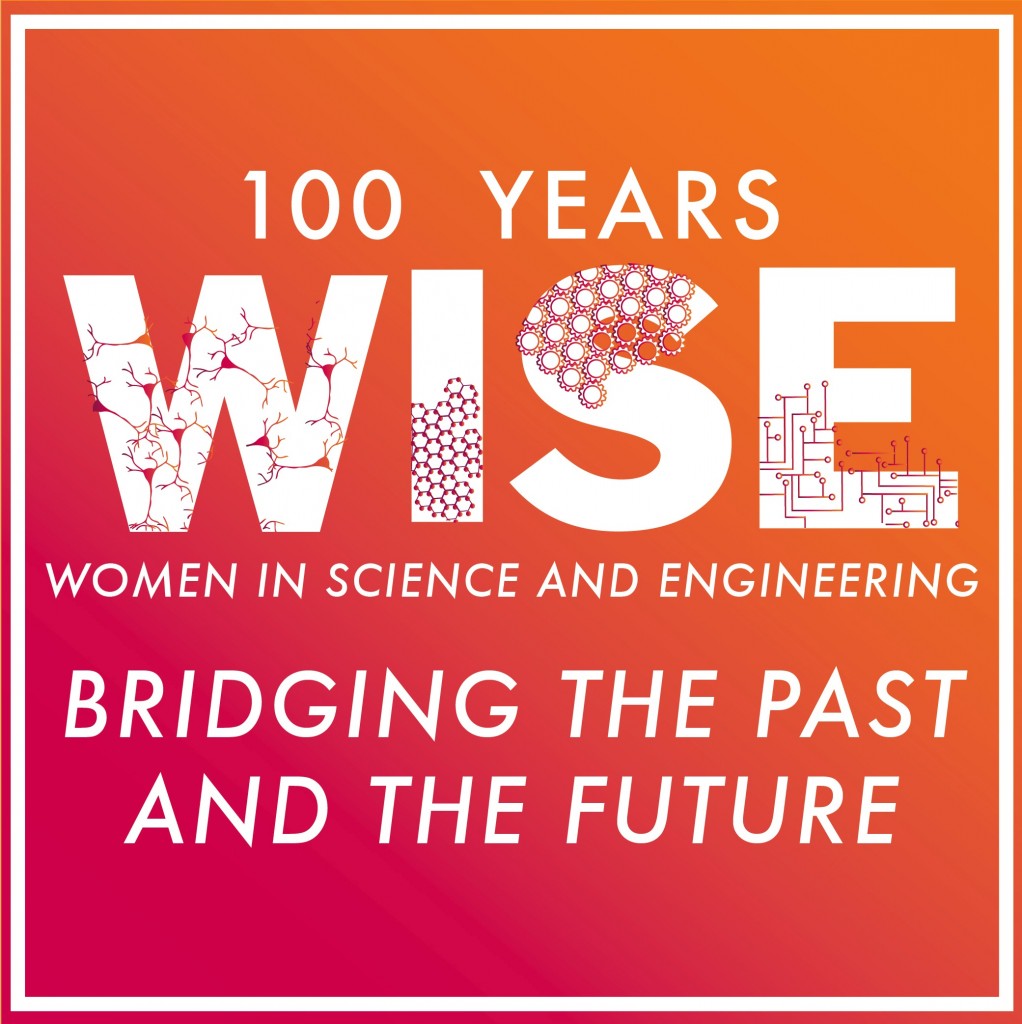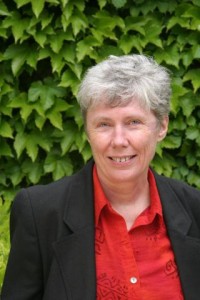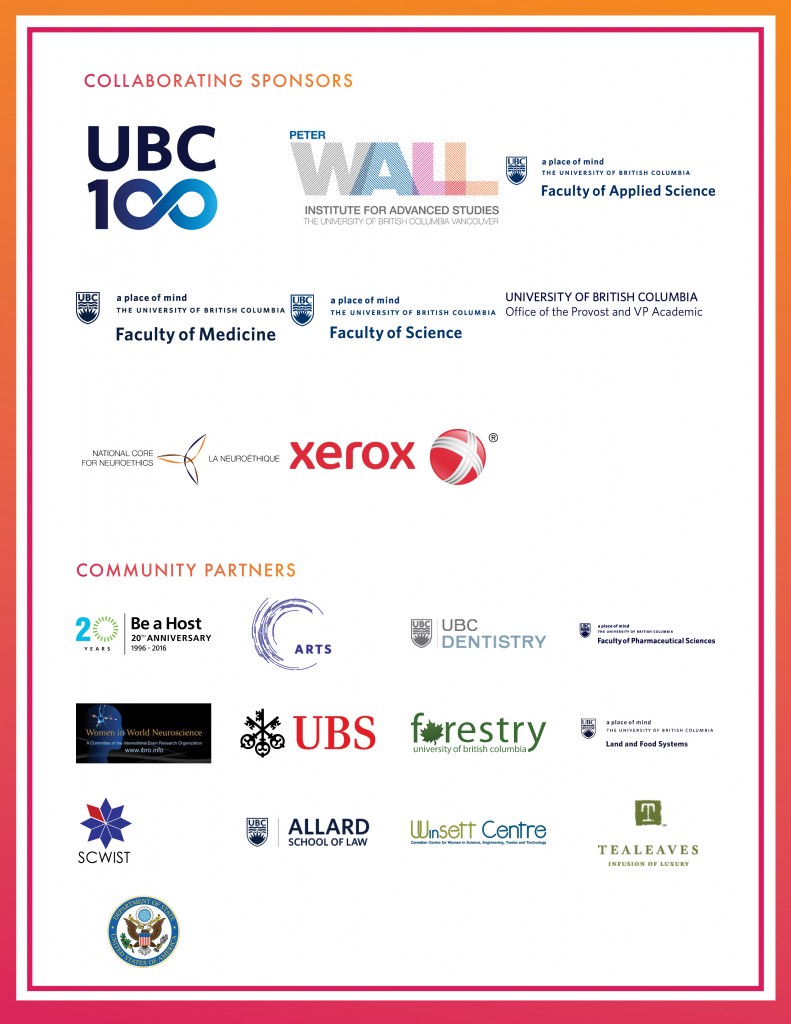Webcast: If you are unable to attend in person, the event will be webcast live.
The University of British Columbia (UBC) and the UBC National Core for Neuroethics are hosting a major event entitled, 100 Years WISE: Women in Science and Engineering Bridging the Past and the Future, to be held on March 9, 2016 at the Chan Shun Concert Hall at The Chan Centre for the Performing Arts, in Vancouver, BC. This event will provide an opportunity for the local and international academic and public community to engage in a dynamic discussion about empowered leadership and WISE diversity with a former Canadian Prime Minister, university presidents, health and industry leaders, and more.
- FREE admission – Everyone is welcome! The event is free and open to the public, but tickets are required for admission. Get your tickets here.
- Questions for any of the panelists can be submitted in advance using #ubc100wise or by email to ubc100wise@gmail.com.
- For more information, please email bacanim@mail.ubc.ca.
SPEAKERS (In presentation order)
“The Changing Conversation about Women’s Equality”
The Right Honourable Kim Campbell, PC, CC, OBC, QC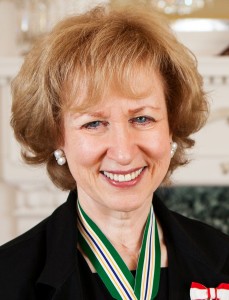
(Special remarks via video presentation)
First Female Prime Minister of Canada
Rt. Hon Kim Campbell served as Canada’s nineteenth and first female Prime Minister in 1993. Leveraging her dynamic and thorough understanding of government from the inside out, Rt. Hon. Campbell speaks on major issues of the day, particularly those related to leadership in the political as well as business arenas. Rt. Hon. Campbell’s leadership role in several global organizations has led her to develop an expertise informed by real time exposure to populations in democratic transition, economic crisis and gender imbalances. Since leaving politics, Rt. Hon. Campbell continues to be involved in global issues where she works with many world leaders and former heads of state and government, and her views are sought in many international fora. Today, Rt. Hon. Campbell devotes the majority of her time to serving as the Founding Principal of the new Peter Lougheed Leadership College at the University of Alberta.
“Who’s On First?”
Nadine Caron, MD, MPH, FRCSC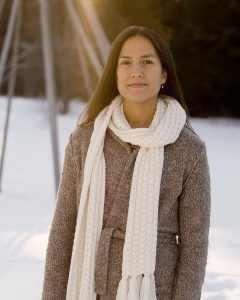
Co-Director, Centre for Excellence in Indigenous Health
Associate Professor, Dept. of Surgery, Faculty of Medicine (NMP),
University of British Columbia (UBC)
Dr. Nadine Caron is an academic Anishnawbe (Sagamok) physician and researcher living in northern BC, providing surgical oncology care for those that call rural and remote Canada home. Dr. Caron’s work involves a variety of audiences and knowledge users including governments, provincial health authorities, national medical organizations, health research funding bodies, and several universities to achieve identified and overlapping objectives. Dr. Caron aims to share her passion and foster ongoing opportunities to eliminate health disparities in rural, remote, northern and Aboriginal communities. In 1997, Dr. Caron became the first Aboriginal woman to graduate from the UBC Faculty of Medicine.
Maria Klawe, PhD
President, Harvey Mudd College
In 2006, Dr. Maria Klawe become Harvey Mudd College’s fifth president. Dr.Klawe has made significant research contributions in several areas of mathematics and computer science, including functional analysis, discrete mathematics, theoretical computer science, human-computer interaction, gender issues in information technology and interactive-multimedia for mathematics education. Her current research focuses on discrete mathematics. A renowned computer scientist and scholar, Dr. Klawe is the first woman to lead the College since its founding in 1955.
“What’s wrong with this picture?”
Simon Peacock, PhD
Dean of Science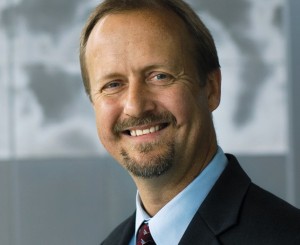
Professor, Department of Earth, Ocean and Atmospheric Sciences, University of British Columbia
Now in his second term leading UBC Science, Dean Simon Peacock has overseen tremendous growth and transformation across the faculty, including system-wide improvements to teaching and learning, major investments in research infrastructure, and substantial progress on equity and working climate issues. Since initiating a task force and implementing related policies in 2007, UBC Science has increased the representation of women in senior administrative roles and among newly appointed research faculty, and bolstered the rate of women promoted to the rank of full professor. Dr. Peacock’s geoscience research focuses on earthquakes, magmatism, and plate tectonics.
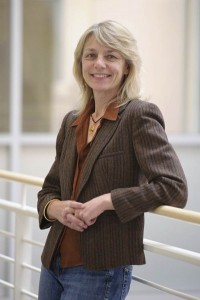 “I am my sister’s keeper – words for modern times”
“I am my sister’s keeper – words for modern times”
Sheri Sheppard, PhD
Professor, School of Engineering, Stanford University
Dr. Sheri Sheppard teaches both undergraduate and graduate design-related classes, and conducts research on fracture mechanics and applied finite element analysis, and on how people become engineers. Dr. Sheppard received a national honor as one of the 2014 U.S. Professors of the Year National Winners for her innovative approach to teaching undergraduate students in a hands-on, problem-solving way that transforms large classes into small group learning laboratories.
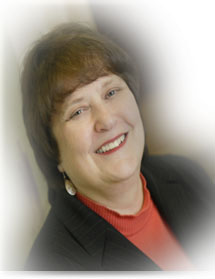 “Keeping All the Balls in the Air”
“Keeping All the Balls in the Air”
Carol Herbert, MD, CCFP, FCFP, FCAHS, FRCPS (Glasg), FRACGP (Hon)
President, Canadian Academy of Health Sciences
Professor Emerita, Schulich School of Medicine & Dentistry, University of Western Ontario
Dr. Carol Herbert is internationally known for her leadership in primary care research, and for her work in clinical health promotion, patient-physician decision-making, and participatory action research with aboriginal communities, focused on diabetes and on environmental effects on human health. Dr. Herbert has been an advocate for women’s and children’s health, pioneering in the provision of services for sexually abused children and was founder and co-director of the Sexual Assault Service for Vancouver. Dr. Herbert is a recognized leader in inter-professional education and collaborative practice, and mentorship of academic women.
“Unintended consequences of showing up (in heels)”
AJung Moon, MASc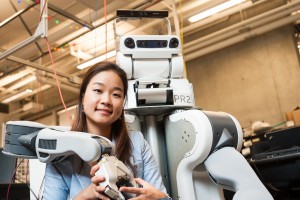
PhD Candidate, Collaborative Advanced Robotics and Intelligent Systems Lab, University of British Columbia (UBC)
Ms. AJung Moon is a PhD candidate and a Vanier Scholar at UBC. Ms. Moon studies human-robot interaction and roboethics / robot ethics. Her research interest is focused on studying the intersection of human-robot interaction (HRI) and roboethics. Ms. Moon specializes in designing nonverbal communication cues (hand gestures, gaze cues) for robots for human-robot collaboration contexts. Currently, she is developing ways for humans and robots to ‘negotiate’ a way out of conflicts using nonverbal gestures. She explores ways in which various stakeholders of robotics technologies can work together to influence interactive robot designs. Representing the Open Roboethics Initiative, a roboethhics think tank Ms. Moon co-founded, she has recently participated and delivered a statement at the United Nations Convention on Certain Conventional Weapons Meeting of States Parties, at Geneva.
“Risk/Reward … the applied science of maximizing career, family and the time with your spouse when ‘off project’”
Catherine Roome, PEng
President and Chief Executive Officer, BC Safety Authority (BCSA)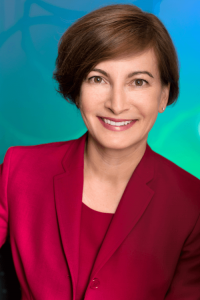
Ms. Catherine Roome believes that people have an extraordinary capacity to contribute to a vision they believe in. Becoming President and Chief Executive Officer in April 2011, she applies her broad experience from other organizations — and in particular her acumen for risk management — to delivering BCSA’s vision of safe technical systems, everywhere. A creative, principled leader, Ms. Roome imagines a better future: the team at BCSA is building physical and virtual networks to connect all those who use, work with or operate technical equipment. She is focused on sharing and building on each other’s knowledge because this is what will advance safety.
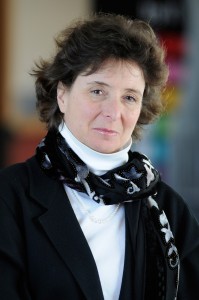 Judy Illes (moderator), PhD, FRSC, FCAHS
Judy Illes (moderator), PhD, FRSC, FCAHS
Canada Research Chair in Neuroethics
Director, National Core for Neuroethics
Professor, Department of Medicine, University of British Columbia
As a pioneer and eminent scholar in the field of neuroethics, Dr. Judy Illes has made groundbreaking contributions to ethical, social, and policy challenges at the intersection of biomedical ethics and neuroscience, with a specific focus on aging and dementia, addiction and mental health, neuroimaging, stem cells, cross-cultural values, and the commercialization of health care.
Organizing Committee members:
- Dr. Judy Illes, National Core for Neuroethics, UBC
- Dean Simon Peacock, Faculty of Science, UBC
- Dr. Elizabeth Croft, Education and Professional Development, Faculty of Applied Science, UBC
- Dr. Darrin Lehman, Department of Psychology, UBC
- Dr. Rachel Kuske, Department of Mathematics, UBC
Events Coordinator: Ms. Marianne Claire Bacani, National Core for Neuroethics, UBC
With special thanks to:
- Prof. Eric Eich, Department of Psychology, UBC
- Mr. Gerald Calderon, Centennial Office, UBC
- Mr. Tyler Harbottle, Government Relations, UBC
- Ms. Heather Amos, Public Affairs Office, UBC
- Ms. Jocelyn Kwok, Faculty of Medicine, UBC
- Ms. Julie Kothlow, Information Technology, UBC
- Ms. Aarti Paul, Information Technology, UBC
- Mr. Mark Van Driel, Information Technology, UBC
- Mr. Simon Robinson, Information Technology, UBC
- Mr. Houston White, Communications & Marketing, UBC
- Mr. Richard Hart, Communications & Marketing, UBC
- Prof. Liisa Galea, Department of Psychology, UBC
- Prof. Julie Robillard, Djavad Mowafaghian Centre for Brain Health, UBC
- All members of the National Core for Neuroethics – UBC
